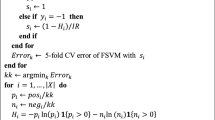Abstract
Imbalanced data is widespread in the fields of medical diagnosis, information security and industrial production. Traditional classification methods can handle balanced data very well. However, when dealing with imbalanced classification, it will favor majority classes, which results in low classification performance. This paper proposes an imbalanced classification method based on deep feature representation, named DL-FSVM. DL-FSVM extracts feature information in the input space using a deep neural network (DNN) to ensure similarity within class and improve the separation between different classes. After obtaining the feature representation, oversampling is performed in this embedding space based on the center distance to enhance the balance of the data distribution. Fuzzy Support Vector Machine (FSVM) is used as the final classifier. Assigning higher misclassification costs to minority class samples through cost-sensitive learning. Experiments were performed on six real-world datasets. The experimental results show that DL-FSVM achieves promising classification performance in three evaluation metrics: G-means, F1-score and AUC.
Access this chapter
Tax calculation will be finalised at checkout
Purchases are for personal use only
Similar content being viewed by others
References
Bhattacharya, S., Rajan, V., Shrivastava, H.: ICU mortality prediction: a classification algorithm for imbalanced datasets. In: The AAAI Conference on Artificial Intelligence, pp.1288–1294 (2017)
Li, H., Wong M.: Financial fraud detection by using grammar-based multi-objective genetic programming with ensemble learning. In: IEEE Congress on Evolutionary Computation (CEC), pp. 1113–1120 (2015)
Wang, S., Yao, X.: Using class imbalance learning for software defect prediction. IEEE Trans. Reliab. 62(2), 434–443 (2013)
Romani, M., et al.: Face memory and face recognition in children and adolescents with attention deficit hyperactivity disorder: a systematic review. Neurosci. Biobehav. Rev. 89, 1–12 (2018)
Tao, X., et al.: Affinity and class probability-based fuzzy support vector machine for imbalanced data sets. Neural Netw. 122, 289–307 (2020)
Schroff, F., Kalenichenko, D., Philbin, J.: Facenet: a unified embedding for face recognition and clustering. In: The IEEE Conference on Computer Vision and Pattern Recognition, pp. 815–823 (2015)
Cooray, K.: Generalized gumbel distribution. J. Appl. Stat. 37(1), 171–179 (2010)
Lin, C.F., Wang, S.D.: Fuzzy support vector machines. IEEE Trans. Neural Netw. 13(2), 464–471 (2002)
Laurikkala, J.: Improving identification of difficult small classes by balancing class distribution. In: Quaglini, S., Barahona, P., Andreassen, S. (eds.) AIME 2001. LNCS (LNAI), vol. 2101, pp. 63–66. Springer, Heidelberg (2001). https://doi.org/10.1007/3-540-48229-6_9
Kang, Q., Chen, X., Li, S., Zhou, M.: A noise-filtered under-sampling scheme for imbalanced classification. IEEE Trans. Cybern. 47(12), 4263–4274 (2016)
Kang, Q., Shi, L., Zhou, M., Wang, X., Wu, Q., Wei, Z.: A distance-based weighted undersampling scheme for support vector machines and its application to imbalanced classification. IEEE Trans. Neural Netw. Learn. Syst. 29(9), 4152–4165 (2017)
Chawla, N.V., Bowyer, K.W., Hall, L.O., Kegelmeyer, W.P.: SMOTE: synthetic minority over-sampling technique. J. Artif. Intell. Res. 16, 321–357 (2002)
Han, H., Wang, W.-Y., Mao, B.-H.: Borderline-SMOTE: a new over-sampling method in imbalanced data sets learning. In: Huang, D.-S., Zhang, X.-P., Huang, G.-B. (eds.) ICIC 2005. LNCS, vol. 3644, pp. 878–887. Springer, Heidelberg (2005). https://doi.org/10.1007/11538059_91
He, H., Bai, Y., Garcia, E.A., Li, S.: ADASYN: adaptive synthetic sampling approach for imbalanced learning. In: IEEE International Joint Conference on Neural Networks (IEEE World Congress on Computational Intelligence), pp. 1322–1328. IEEE (2008)
Mathew, J., Luo, M., Pang, C.K., Chan, H.L.: Kernel-based SMOTE for SVM classification of imbalanced datasets. In: 41st Annual Conference of the IEEE Industrial Electronics Society (IECON 2015), pp. 1127–1132. IEEE (2015)
Mathew, J., Pang, C.K., Luo, M., Leong, W.H.: Classification of imbalanced data by oversampling in kernel space of support vector machines. IEEE Trans. Neural Netw. Learn. Syst. 29(9), 4065–4076 (2017)
Batuwita, R., Palade, V.: FSVM-CIL: fuzzy support vector machines for class imbalance learning. IEEE Trans. Fuzzy Syst. 18(3), 558–571 (2010)
Yu, H., Sun, C., Yang, X., Zheng, S., Zou, H.: Fuzzy support vector machine with relative density information for classifying imbalanced data. IEEE Trans. Fuzzy Syst. 27(12), 2353–2367 (2019)
Tao, X., et al.: Affinity and class probability-based fuzzy support vector machine for imbalanced data sets. Neural Netw. 122, 289–307 (2020)
Wang, S., Yao, X.: Diversity analysis on imbalanced data sets by using ensemble models. In: IEEE Symposium on Computational Intelligence and Data Mining, pp. 324–331. IEEE (2009)
Chawla, N.V., Lazarevic, A., Hall, L.O., Bowyer, K.W.: SMOTEBoost: improving prediction of the minority class in boosting. In: Lavrač, N., Gamberger, D., Todorovski, L., Blockeel, H. (eds.) PKDD 2003. LNCS (LNAI), vol. 2838, pp. 107–119. Springer, Heidelberg (2003). https://doi.org/10.1007/978-3-540-39804-2_12
Krizhevsky, A., Sutskever, I., Hinton, G.E.: Imagenet classification with deep convolutional neural networks. Adv. Neural. Inf. Process. Syst. 25, 1097–1105 (2012)
He, K., Zhang, X., Ren, S., Sun, J.: Deep residual learning for image recognition. In: IEEE Conference on Computer Vision and Pattern Recognition, pp. 770–778 (2016)
Ng, W.W., Zeng, G., Zhang, J., Yeung, D.S., Pedrycz, W.: Dual autoencoders features for imbalance classification problem. Pattern Recogn. 60, 875–889 (2016)
Acknowledgements
This work was supported in part by the National Natural Science Foundation of China (61703279), in part by the Shanghai Municipal Science and Technology Major Project (2021SHZDZX0100) and the Fundamental Research Funds for the Central Universities.
Author information
Authors and Affiliations
Corresponding author
Editor information
Editors and Affiliations
Rights and permissions
Copyright information
© 2022 Springer Nature Singapore Pte Ltd.
About this paper
Cite this paper
Wang, K., An, J., Ma, X., Ma, C., Bao, H. (2022). Imbalance Classification Based on Deep Learning and Fuzzy Support Vector Machine. In: Pan, L., Cui, Z., Cai, J., Li, L. (eds) Bio-Inspired Computing: Theories and Applications. BIC-TA 2021. Communications in Computer and Information Science, vol 1566. Springer, Singapore. https://doi.org/10.1007/978-981-19-1253-5_3
Download citation
DOI: https://doi.org/10.1007/978-981-19-1253-5_3
Published:
Publisher Name: Springer, Singapore
Print ISBN: 978-981-19-1252-8
Online ISBN: 978-981-19-1253-5
eBook Packages: Computer ScienceComputer Science (R0)




